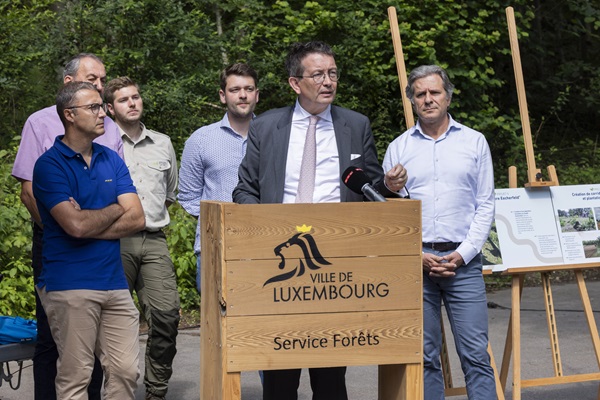 Credit: ©VDL Photothèque/Christian Aschman
Credit: ©VDL Photothèque/Christian Aschman
On Wednesday 17 July 2024, Maurice Bauer, the First Alderman of the City of Luxembourg, responsible for the environment, presented the priorities and upcoming projects for environmental protection.
The City of Luxembourg’s Forestry Department (Service Forêts) noted that these projects aim to make the forest heritage and its ecosystems more resilient, as the Nature and Forest Agency has observed a deterioration in the health of trees over several decades.
Alderman Bauer explained: "For many years, the City has been pursuing proactive policies aimed at protecting the environment and the climate. However, the climate emergency requires us to strengthen our action in favour of protecting nature and in particular our municipal forests which cover 1,100 ha, or around 20% of the municipal territory. Also, the approximately 21,000 urban and park trees are affected since some indigenous varieties are no longer able to withstand the weather phenomena linked to climate change. Based on this observation, we have made environmental protection a top priority that must be maintained over the long term to preserve our natural heritage in the long term. We have therefore developed a ‘Roadmap’ in recent months containing five priorities that we have broken down into concrete projects that we want to implement in the months and years to come.”
The City of Luxembourg has outlined five key priorities for the coming years to address climate change and enhance forest management. The first priority is combatting the effects of climate change and ensuring the safety of citizens, as recent extreme weather conditions have seriously weakened forests and cliffs. Amidst droughts and heat waves, floods and storms, securing dangerous trees and cliffs is reportedly a top priority for the City’s Forestry Department. To support this, the Secuforet.vdl.lu website now provides practical information on safety in municipal forests, including construction sites, diversions, rescue points, real-time weather alerts and wildfire safety tips. Information panels with QR codes linking to this site will be installed at the entrances to municipal forest car parks.
The second reported priority is promoting sustainable forest management. Since 2007, the municipal forests have been managed according to Forest Stewardship Council (FSC) standards with a focus on silviculture close to nature. Efforts will be strengthened with projects such as restoring ponds, creating “sponge forests” and increasing the use of draft horses for forestry work, the Forestry Department noted.
A third priority involves planting trees and adapting to the new challenges of climate change. Trees and forests have numerous benefits, including CO₂ fixation and storage, air enrichment with oxygen, temperature regulation and biodiversity enhancement. Projects under this priority include the creation of a forest nursery at Eecherfeld in the Muhlenbach district, where young trees will be grown from seeds collected from Luxembourg City’s municipal forests. These young plants will be replanted in the municipal forests, and the nursery will also serve as an educational site for primary school students. Additionally, ecological corridors and enhancements in the city's agricultural areas will be developed, including planting a new forest and creating agroforestry projects.
Another project involves a feasibility study for creating a nature reserve of approximately 200 hectares at Bambësch, where a portion of the forest will be left to evolve freely. An educational trail might also be constructed there, according to the Forestry Department. Furthermore, a "forest of the future" will be planted near the Huerbaach in Hamm to analyse the resistance and adaptation of new tree varieties to local climate conditions. The City of Luxembourg will participate in the Forlux research project, which aims to study how municipal forests react to new weather conditions and how forest management can be adapted. This project will equip different sites with sensors and weather stations to collect data, making the City’s municipal forests among the most studied in Europe.
The fourth priority focuses on further optimising the local exploitation of wood resources. Currently, around 60% of the wood harvested in municipal forests is used by the City of Luxembourg for urban and forestry furniture or energy. An analysis is underway to explore possibilities for increasing the share of wood used for the City’s needs.
The fifth reported priority is promoting an attractive and multifunctional urban forest. The Forestry Department noted it manages over 100 km of trails and walks, creates and restores forest furniture and infrastructure, and offers numerous activities and educational visits in collaboration with nature stewards and the Creative Learning Centre (CAPEL). Following the "Urban Forestry - Mäi Stater Bësch" (my City forest) survey, the City confirmed its commitment to implementing new measures over the next three years to meet citizens' demands. These measures reportedly include adapting existing paths and trails to new uses, improving signage, repairing forest paths and car parks and modernising outdoor sports infrastructure. The Devashaff site will be modernised to include a reception and information centre for visitors to learn about municipal forests, biodiversity, nature protection and the effects of climate change on ecosystems.
To further raise public awareness, the City of Luxembourg has also published a new brochure titled Trees in the City, which highlights urban and park trees in the capital. The brochure emphasises the significant contributions of trees to air quality, cooling streets and public spaces and their beneficial effects on physical and mental health. It includes photos, texts and illustrations on the history of the City’s parks, the tree register, the concept of climate trees, tree maintenance and protection. The brochure is available on request in English, French and German and can be accessed at the Lëtzebuerg City Bibliothèque (city library) or online at arbres.vdl.lu.








